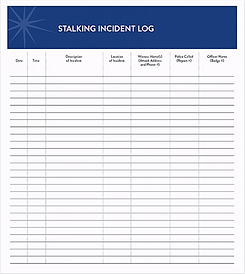
stalked diaries
Services
Stalking comes in many forms, with each case having its own distinction from another. Regardless of the means or methods, stalking, to all victims is universally unwanted, unjust, and unlawful. Stalking victims may experience feelings of isolation, frustration, and helplessness. Repeated violations to one's privacy can adversely affect their livelihood, social interactions, mental health & wellbeing. Help is available for those that need it. I've listed some outside resources below.
Standing up to bullying is incredibly important, It can make a difference both for the person being bullied and for creating a safer, more supportive environment overall.
If you know someone who's being bullied, cyber bullied or you're a target of bullying yourself, please take the time to view your options at StopBullying.gov.
Resources for Information and Assistance
Stalking Resource Center
National Center for Victims of Crime
1-202-467-8700
www.ncvc.org/src
National Network to End Domestic Violence
Safety Net Project
1-202-543-5566
https://nnedv.org/content/technology-safety/
National Domestic Violence Hotline
1-800-799-SAFE (7233)
TTY 1-800-787-3224
www.thehotline.org
Directory of Crime Victim Services
Office for Victims of Crime
Office of Justice Programs
U.S. Department of Justice
http://ovc.ncjrs.gov/findvictimservices

KEEPING RECORD OF STALKING BEHAVIOR
Keeping record of stalking behavior and incidents is important. If seeking a restraining order, a stalking incident report is key. These logs are usually kept as a record of specific behaviors, such as unwanted contact, following, or other forms of harassment. The purpose of such a log is to help track incidents for reporting to authorities or to support a legal case, if necessary.
If you're looking to create or maintain a stalking log, it’s important to include the following details for each incident:
-
Date and Time: When the incident occurred.
-
Location: Where the incident took place.
-
Description: A detailed account of what happened.
-
Evidence: Any supporting materials (photos, messages, recordings, etc.).
-
Witnesses: Any people who may have witnessed the incident.
-
Action Taken: Any steps you took, such as reporting it to authorities or telling the person to stop.

FBI IC3 DIVISION
The FBI's IC3 (Internet Crime Complaint Center) is a division of the Federal Bureau of Investigation that receives and reviews internet crime complaints. It provides a platform for the public to report cybercrimes and internet-related criminal activities, such as online fraud, hacking, identity theft, and scams.
When individuals or businesses fall victim to cybercrime, they can file a complaint with the IC3, which helps to track and investigate these issues. The IC3 works alongside other law enforcement agencies to address and combat cybercrime at local, national, and international levels.
An IC3 report submission serves, if nothing else, a record of complaint.
If you are dealing with an internet crime or have witnessed one, you can visit the IC3 website to file a report: www.ic3.gov.